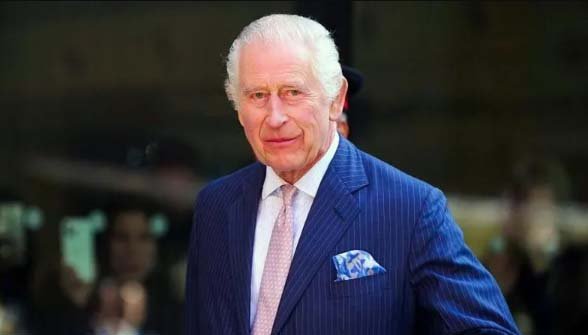King in call for unity after ‘aggression’ of riots
Published: 10 August 2024, 7:36:05

King Charles spoke to the PM and police chiefs about the wave of disorder
The King has praised the way “community spirit” and “compassion” have countered the “aggression and criminality” on display during the riots, says Buckingham Palace.
King Charles had been in phone conversations on Friday evening with Prime Minister Sir Keir Starmer and police chiefs.
He gave his “heartfelt thanks to the police and emergency services for all they are doing to restore peace in those areas that have been affected by violent disorder”, said a palace spokesman.
In a call for unity, the King hoped that “shared values of mutual respect and understanding will continue to strengthen and unite the nation”.
King Charles, currently in Scotland, spoke to the prime minister about the wave of disorder and riots.
In another joint call, the King spoke to Chief Constable Gavin Stephens, chair of the National Police Chiefs Council and to UK Gold Commander Ben Harrington, Chief Constable of Essex, thanking the police for their efforts and getting an update on the protests.
“The King shared how he had been greatly encouraged by the many examples of community spirit that had countered the aggression and criminality from a few with the compassion and resilience of the many,” said a palace spokesman.
There had been questions about whether the King would speak about the riots – and as a politically-neutral monarch he had left the initial response to ministers.
But the King has a long record of working to build bridges between different faiths and cultures – calling Britain a “community of communities”.
And against the divisions revealed during this unrest, he has made his views known, calling for tolerance and “mutual respect and understanding”.
He is said to have been involved in behind-the-scenes efforts to bring together communities affected by the riots, during his summer break in Scotland, in a year in which he has been treated for cancer.
But it is not expected that the King will make any immediate visits to trouble spots until the unrest is over, with the response to the protests seen as being the responsibility of the government.
This follows the pattern seen after the outbreak of riots in 2011, during which Queen Elizabeth didn’t put out any messages, but royal visits took place after calm had been restored.
The King, then Prince Charles, subsequently visited Tottenham and other affected areas to encourage cross-community relations in the wake of the riots.
There had previously been criticism of the lack of an intervention by the King.
“We’re told the monarch is supposed to be a figurehead who unites the nation, yet when the nation is in crisis he’s nowhere to be seen,” said Graham Smith, leader of the anti-monarchy group, Republic.
That was rejected by historian and author Sir Anthony Seldon, who said the King should not get immediately involved in debates over the riots.
“He is head of state, and it’s appropriate that while the crisis is going on, the head of government, the prime minister, handles the crisis management and says what is needed to be said.
“The time for the King to speak, if at all, is when everything has calmed down again,” Sir Anthony told the BBC.
Another practical sensitivity about carrying out any immediate royal visits to riot-hit areas has been a worry about adding pressure to police on the ground.





